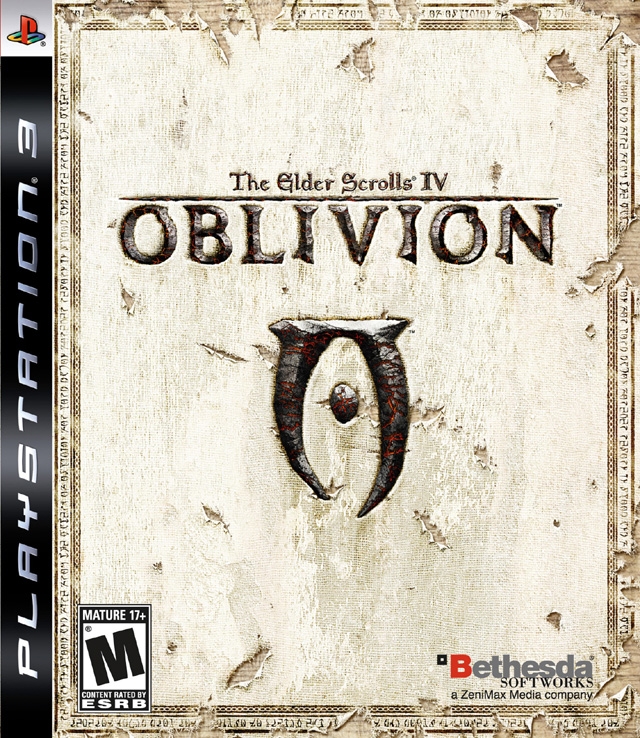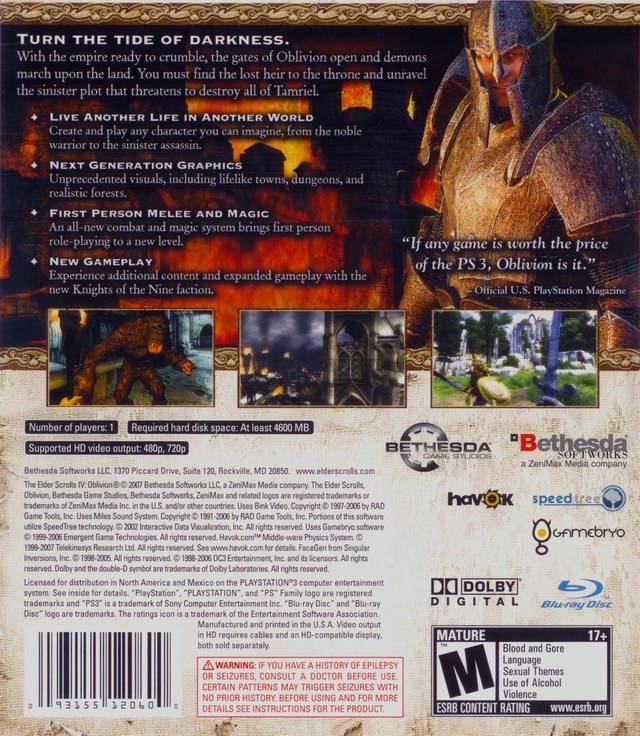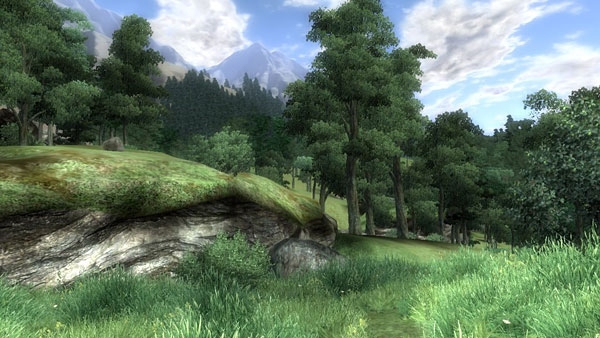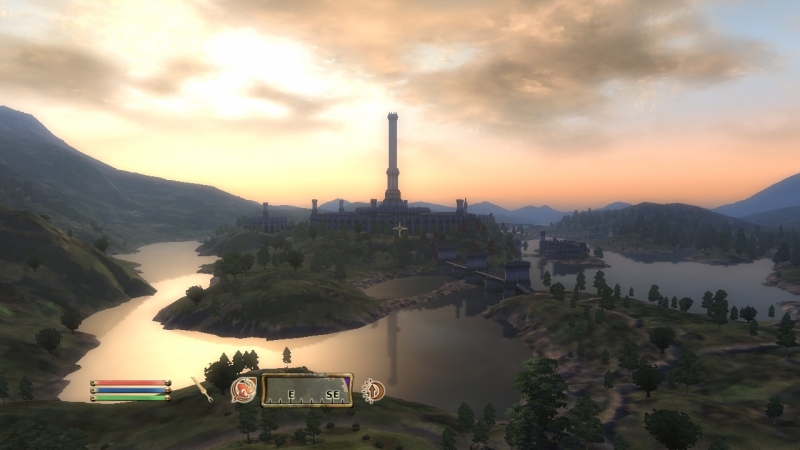Existing User Log In
New User Registration
Register for a free account to gain full access to the VGChartz Network and join our thriving community.





America - Front


America - Back

The Elder Scrolls is one of gaming’s most famous Western role-playing series. It’s been a PC-focused franchise, for the most part, with the first two games exclusive to Windows, and the third, Morrowind, ported to the original Xbox a few months after its initial release. With Oblivion, Bethesda Softworks decided to try their hand at developing for the HD consoles, first the Xbox 360, and a year later, the PlayStation 3. And they were remarkably successful.
Oblivion, like its predecessors, takes place in the fictional land of Tamriel, the largest continent on the planet of Nirn. Tamriel is split up into nine independently-governed provinces, one for each of the ten races, with the province of High Rock shared by the Bretons and Orsimer. While none of the provinces are exclusively populated by a single race, each is home to one of the races, and this race makes up a large percentage of the overall population. Oblivion takes place mostly in Cyrodiil, the province of the Imperial race of humans. However, since Cyrodiil is the “capital” of Tamriel, as such, and the seat of the Elder Council which rules the continent. There are citizens of every race in fairly large numbers, 1000 named NPCs in total, spread throughout the land and concentrated in the large cities. Even more NPCs can be found, with generic names. Many NPCs provide, or are involved in, quests, but some just provide idle banter and perhaps a consequence-free kill target.

A smaller part of the game is set in Oblivion, the endless realm surrounding Nirn, which is ruled by the Daedra Lords. Though you do visit the realms of many different Daedra, you will find yourself in Mehrunes Dagon’s plane of Oblivion through a fair bit of the main quest; he is the arch enemy of your character. You enter through Oblivion Gates which are dotted throughout the land. Most are optional, but a few are involved in missions in the Main Quest. Dagon’s Oblivion looks like the stereotypical Hell: pits of lava, fiery skies and demonic beasts. You are constantly in danger, and must fight your way to the top of the Tower and remove the Sigil Stone from its pedestal to escape and permanently close the Gate.
Upon starting a new game you are treated to a cutscene of the Emperor, Uriel Septim, explaining his predicament: Mehrunes Dagon is massing forces to invade Tamriel and kill all mortal beings within. You then create a character, choosing his/her race and appearance. The races are split into three main categories:
Men (Imperials, Bretons, Nords and Redguards),
Mer or Elves (Altmer [High Elves], Dunmer [Dark Elves], Bosmer [Wood Elves] and Orsimer [Orcs]),
Beasts (Khajiit [lions] and Argonians [lizards]).
Each of these races has a bonus in some attributes, and a disadvantage in others. Attributes are your character’s basic specifications: Strength, Endurance, Speed, Personality, Luck, Agility, Intelligence and Willpower. Each of these improves your character: Strength increasing attack damage, Intelligence increasing Magicka, and so on. These increase when your character levels up. Your character has three status bars: Health, Magicka and Fatigue. Health is the amount of damage your character can withstand, Magicka is an energy bar for spells, and Fatigue reflects how tired your character is, affecting speed and combat. These three all regenerate over time, or can be refilled with the use of potions or spells.

In addition to these attributes, there are Skills. These reflect your character’s aptitude in different aspects of the game: Athletics, Lockpicking, Heavy Armor, and many more. You choose seven of these to be your Major Skills, and these automatically gain 20 levels. Skills begin at level 5 for minor skills, and level 25 for major skills. The maximum level is 100. Level 5 makes you a Novice of that skill. Level 25 is an Apprentice. 50 is a Journeyman, 75 is an Expert, and 100 is a Master. As you reach each new stage, you gain new abilities. For the spellcasting skills, this simply entails allowing you to cast more difficult spells. For other skills, you will acquire bonuses, such as special power attacks, or the ability to jump out of water. There are so many of these skills that you will inevitably lose track of some, and like so many aspects of the game, it begins to get overwhelming. This is one of Oblivion’s main flaws, and also, to an extent, its most endearing feature: there is so much to do, and explore, that you don’t know where to start; there are so many skills, weapons and spells that you have no idea which to use and which to ignore. Because the fact is that you’ll only end up using a small number of them, and once you’ve reached a high level you’ll find that the enemies are so weak that you’ll have no trouble killing them with the same weapon and the same spell each time. For this reason, once you’ve hit the late 20s in character level, everything just becomes a huge bore.
The game attempts to solve this with the Levelled Skill System. Essentially, as you level and grow in skill, your enemies will grow stronger and faster, and sometimes change completely. This stops the game from being a complete cakewalk, but where an endgame is supposed to be difficult; in Oblivion it is remarkably easy. With your 50 health potions, 200 point damage spell and rare enchanted double handed sword, no enemy stands a chance against you.
Oblivion uses a rather eccentric system of leveling. Rather than gaining experience through vanquishing enormous foes and travelling on heroic crusades, you inch towards the next level by improving your major skills. You could, in theory, do this in the bedroom of a hotel, conjuring skeletons to raise your Conjuration skill, and sleeping whenever you need to regain Magicka. But that would be deliberately trying to spite the game.
Once you have left the tutorial sewers, you are thrown into the massive province of Cyrodiil, and you really have no idea where to begin. The quality of one aspect of Oblivion is agreed on by all to be fantastic: the environments. Lush trees in grassy fields sway in the wind as water trickles and quiet music plays. Though Oblivion employs a fast-travel system for long distances (simply select the target on your map, if it’s already been visited or is a major city), you will want to travel shorter distances on foot (or later, on horseback), to take in the breathtaking environment. As with all large open worlds, there are ample places to get your character stuck, and some regions which are a pain to traverse (in particular, the mountain ranges). But it’s all well and good, for the most part, if you stick to paths.

Other than the Main Quest, there are many standalone quests and a few other quest arcs: the three Guilds and the Dark Brotherhood are among the most prominent. In the Main Quest, you search for Uriel Septim’s heir after he is killed, and must close a series of Oblivion gates, killing demons, to save Cyrodiil from demonic annihilation. The Dark Brotherhood involves tracking down innocent people and brutally murdering them. It’s no surprise that this is one of the most popular parts of the game.
Not that you can just waltz in and stab them. The cities are filled with (rather dim) guards. If these honourable and simple men witness you performing a crime, they will arrest you. You have the option to pay a fine, and be released, serve your time in jail (decreasing your skill levels) or resist arrest and slaughter the guard, and his seemingly infinite stream of colleagues. But the guards don’t just arrest you for crimes, no. One of the simple pleasures of Oblivion is casting a Frenzy spell on a civilian, making them attack you and thereby becoming a target for every guard in a ten mile radius. Guards are not exempt from this. If a guard attacks another guard, he will become a target, and the arrest quickly grows into an enormous brawl, while you quietly slip out of the city gates.
The combat is relatively simple. As with all parts of the game, you can choose a first-person or third-person view. You press R1/RT to swing your weapon, L1/LT to block, and R2/RB to cast a spell. Spells can be used to aid you, hinder or damage your foe, or summon a creature to help you in battle. Enemies range from mud crabs, to trolls, to giant demons. But combat feels a little… empty. The rather forced battle cries of your enemies do nothing to change that. And as I previously mentioned, once you hit a certain point in the game it’s so easy as to be monotonous.

The graphics are impressive for a multiplatform game, particularly the green fields, trees, buildings and landscapes. The plane of Oblivion looks remarkably less impressive, with artificial-looking fires and all of three different colours. NPC character models and animations are fantastic, but enemies move like robots and don’t look much better. Crashes are rare, but slowdown is reasonably common. There are loading times, occasionally annoyingly long, but usually around 5 seconds in length, whenever you enter a city, building, cave or anything similar. There is a problem with the PS3 version where you will endure one of these loading times to be treated to a blank screen, and you have to restart the system, but this is uncommon. The game takes up a staggering 5GB of hard disk space, but it launched relatively early in the PS3’s life cycle, so Bethesda can be forgiven for this. The X360 version has paid downloadable content which, for one reason or another, was never ported to PS3, but these are not part of the main game, they are simply extra quest lines and items.
Voice acting isn’t bad, except for the fact that they couldn’t be bothered to hire more than 10 voice actors, and so a large number of NPCs will sound exactly the same. Not helped by the fact that many have the same dialogue. Perhaps the most strange and hilarious of all is when NPCs decide to converse with one another, spouting complete nonsense, with a few phrases, such as “I’ve heard others say the same” and “I’m not certain about that” interjected at seemingly random and completely inappropriate places. The musical score is far better. The track always suits the moment, changing with the initiation of combat, or the entering of a dangerous area. The music is interspersed with some relatively decent sound effects now and again.
A lot more could be said about Oblivion, but you would discover it yourself by playing, and there is simply too much to list. The game is truly enormous.

Oblivion is not a bad game, not in the slightest. If you can find the motivation to enjoy everything (a big if), the game can provide weeks and months of enjoyment. But there’s no real reason to go back a second time, because you can do everything the first time, even if it completely wrecks the continuity and makes no sense. You can be a wizard and a knight, a thief and a champion gladiator, the savior of Cyrodiil and a mass murderer. This makes the first playthrough a blast, but subsequent playthroughs would be completely pointless. And even on your first playthrough, you will likely give up before you’ve completed half the content in the game. But you’ll have been playing for some 150-200 hours, so it’s not so bad.
I was one of those who enjoyed the game. However, many find the lack of structure and open-endedness to the point of chaos rather annoying, and give up after just a few hours, preferring games like Bethesda’s later effort Fallout 3. You can’t really know until you try the game. But if you like linear experiences, you won’t find one here. If you like structured RPGs, you won’t find one here. If, however, like me, you want to explore a beautiful open world, occasionally venturing into caverns and completing quests, killing the odd monster and discovering great treasures, you will find an experience in Oblivion that is almost without equal.










| Total Sales |
0.14m
Japan |
1.69m
NA |
0.86m
Europe |
0.44m
Others |
3.12m
Total |
| 1 | n/a | 48,526 | n/a | 8,563 | 57,089 |
| 2 | n/a | 17,455 | n/a | 3,080 | 20,535 |
| 3 | n/a | 12,686 | n/a | 2,239 | 14,925 |
| 4 | n/a | 9,216 | n/a | 1,626 | 10,842 |
| 5 | n/a | 6,923 | n/a | 1,222 | 8,145 |
| 6 | n/a | 5,880 | 27,242 | 10,119 | 43,241 |
| 7 | n/a | 5,691 | 25,792 | 9,601 | 41,084 |
| 8 | n/a | 5,878 | 21,533 | 8,215 | 35,626 |
| 9 | n/a | 5,793 | 15,854 | 6,307 | 27,954 |
| 10 | n/a | 5,264 | 12,067 | 4,951 | 22,282 |
|
|
|
|
|
Slimebeast
posted 04/11/2011, 12:18
The best game of all time. Currently selling at a rate of over 10K per week in anticipation of Skyrim! Message | Report |
|
|
|
|
|
|
|
|
|
|
|
Slimebeast
posted 07/04/2011, 10:33
Realistically, a game can't be this good. It's the perfect game. 2 million on a staggered launch is very good sales. Message | Report |